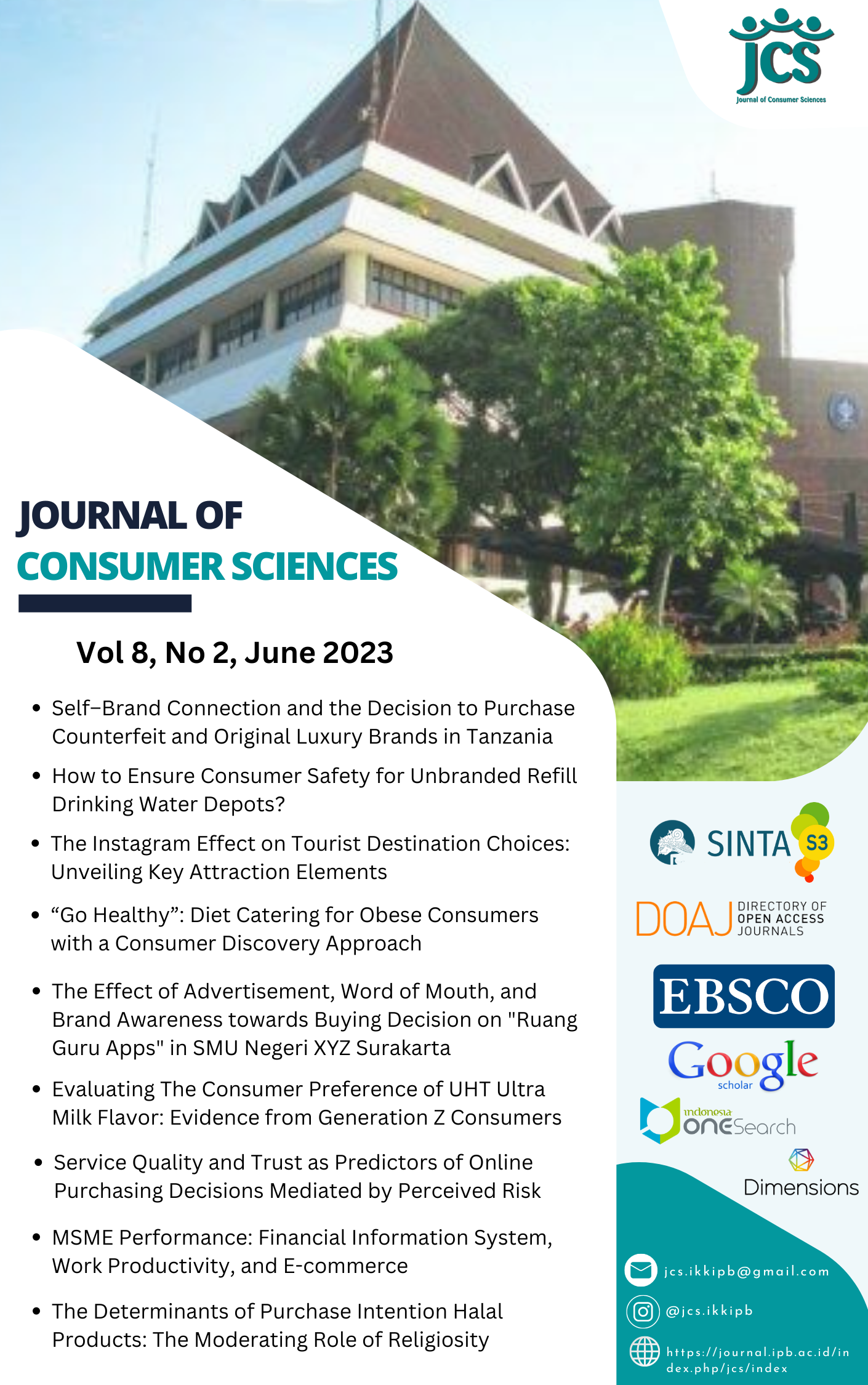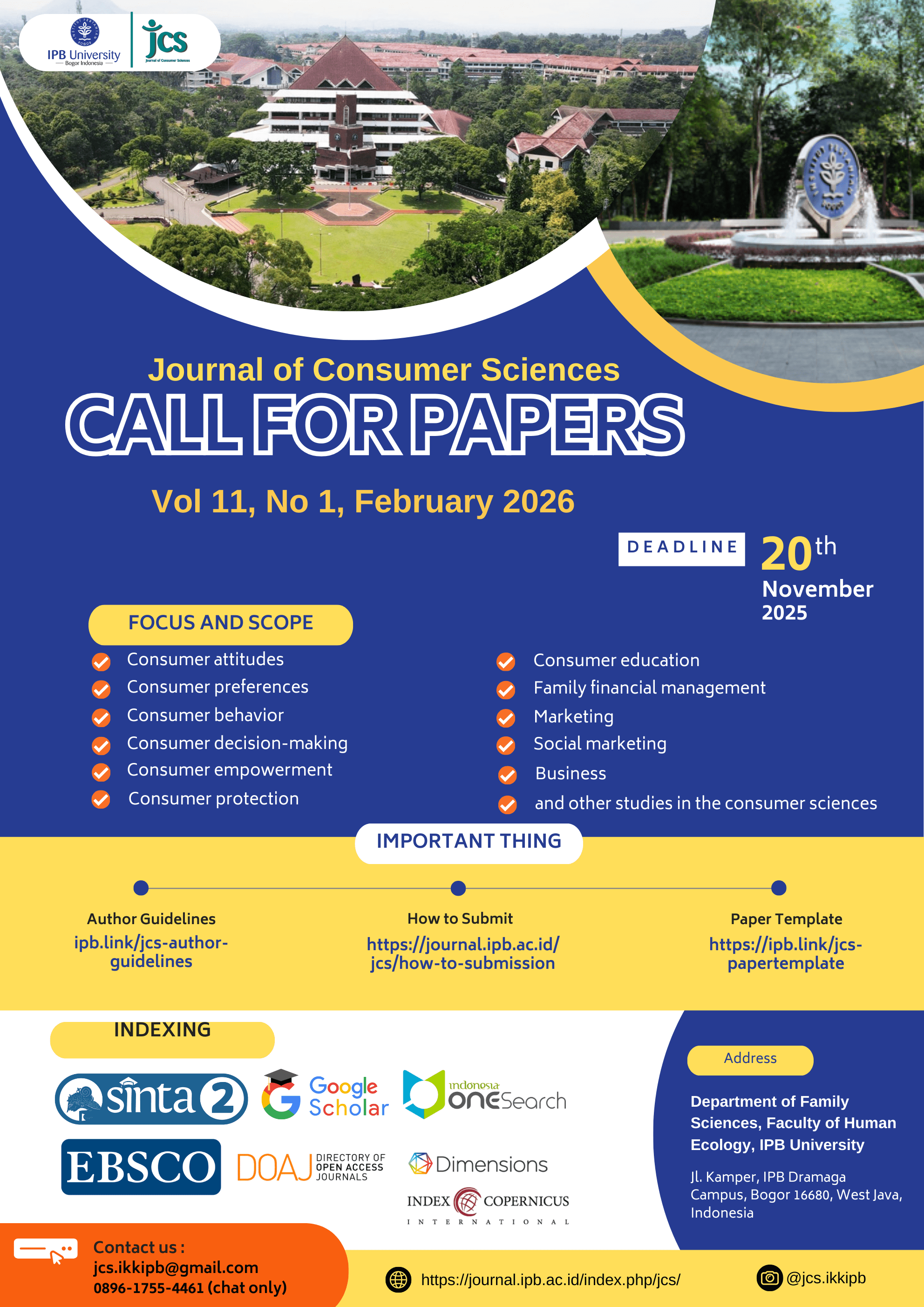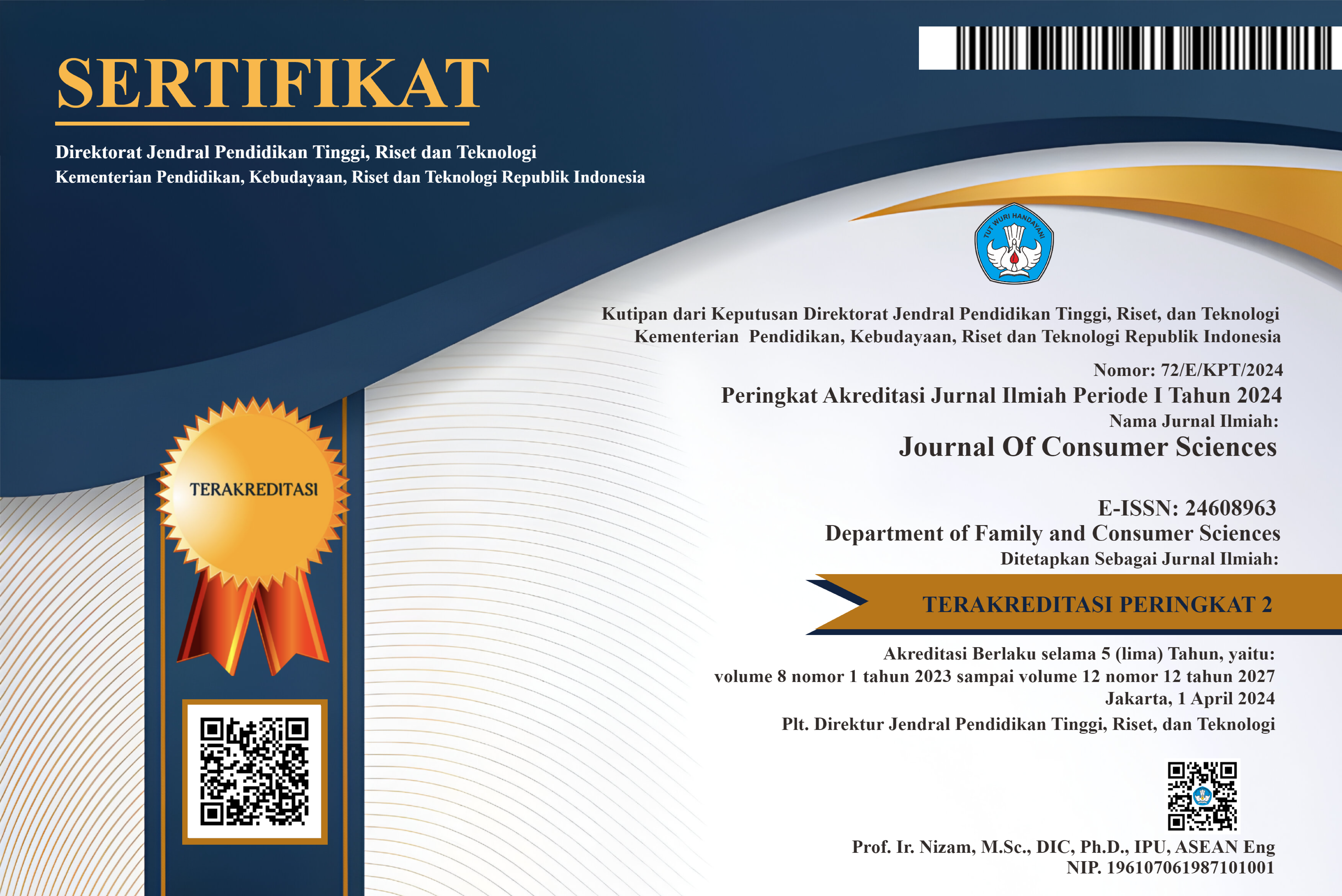The Determinants of Purchase Intention Halal Products: The Moderating Role of Religiosity
DOI:
https://doi.org/10.29244/jcs.8.2.220-233Keywords:
attitude, halal product, purchase intention, religiosity, subjective normsAbstract
Halal marketing is an important concept for marketers doing business in Muslim-majority countries. To predict consumer behavior toward halal products, the Theory of Reasoned Action (TRA) explains the two components of the formation of purchase intentions, namely attitude and subjective norms. Consumer concern for the lawfulness of a product is also influenced by a person's level of religiosity. This study aims to empirically test the ability of religiosity as a moderator that affects attitudes, and subjective norms on purchase intentions. This study applied a quantitative design. One hundred and ninety respondents in Indonesia were collected through random sampling. Data were collected through an online questionnaire using Google Forms and analyzed by Structural Equation Modelling (SEM). This study explains that subjective attitudes and norms have a positive and significant effect on purchase intentions. Religiosity as a moderator is able to influence subjective attitudes and norms on purchase intentions. The results of this study provide information that halal products are unique because they have spiritual elements. In this regard, marketers must remember that Muslim consumers exercise additional vigilance to ensure that the product fulfills not only functional needs but also spiritual needs.
References
Afendi, N. A., Azizan, F. L., & Darami, A. I. (2014). Determinants of halal purchase intention: case in Perlis. International Journal Od Business and Social Research, 4(5), 118–123.
Agarwala, R., Mishra, P., & Singh, R. (2019). Religiosity and consumer behavior: a summarizing review. Journal of Management, Spirituality and Religion, 16(1), 32–54. https://doi.org/10.1080/14766086.2018.1495098
Ahmad, A. N., Rahman, A. A., & Rahman, S. A. (2015). Assessing knowledge and religiosity on consumer behavior towards halal food and cosmetic products. International Journal of Social Science and Humanity, 5(1), 10–14. https://doi.org/10.7763/ijssh.2015.v5.413
Ahmadova, E., & Aliyev, K. (2021). Determinants of attitudes towards halal products: empirical evidence from Azerbaijan. Journal of Islamic Marketing, 12(1), 55–69. https://doi.org/10.1108/JIMA-04-2019-0068
Aziz, N. N. A., Abd.Aziz, N. A., Aziz, N. A. A., Omar, Z., & Hassan, W. H. A. W. (2015). A Review on the Emergence and Growth of Halal Studies. Procedia Economics and Finance, 31(15), 325–332. https://doi.org/10.1016/s2212-5671(15)01204-6
Ajzen, I. (2005). Attitudes, Personality & Behavior. New York(US): Open University Press.
Alam, S. S., & Sayuti, N. M. (2011). Applying the Theory of Planned Behavior (TPB) in halal food purchasing. International Journal of Commerce and Management, 21(1), 8–20. https://doi.org/10.1108/10569211111111676
Al-Swidi, A., Huque, S. M. R., Hafeez, M. H., & Shariff, M. N. M. (2014). The role of subjective norms in theory of planned behavior in the context of organic food consumption. British Food Journal, 116(10), 1561–1580. https://doi.org/10.1108/BFJ-05-2013-0105
Amalia, F. A., Sosianika, A., & Suhartanto, D. (2020). Indonesian millennials’ halal food purchasing: merely a habit? British Food Journal, 122(4), 1185–1198. https://doi.org/10.1108/BFJ-10-2019-0748
Amin, H. (2013). Factors influencing Malaysian Bank customers to choose islamic credit cards: empirical evidence from the TRA model. Journal of Islamic Marketing, 4(3), 245–263. https://doi.org/10.1108/JIMA-02-2012-0013
Ateeq-ur-Rehman, & Shabbir, M. S. (2010). The relationship between religiosity and new product adoption. Journal of Islamic Marketing, 1(1), 63–69. https://doi.org/10.1108/17590831011026231
Bakar, A., Lee, R., & Hashim, N. H. (2013). Parsing religiosity, guilt and materialism on consumer ethics. Journal of Islamic Marketing, 4(3), 232–244. https://doi.org/DOI 10.1108/JIMA-04-2012-0018
Bashir, A. M. (2019). Effect of halal awareness, halal logo and attitude on foreign consumers’ purchase intention. British Food Journal, 121(9), 1998–2015. https://doi.org/10.1108/BFJ-01-2019-0011
Bashir, A. M., Bayat, A., Olutuase, S. O., & Abdul Latiff, Z. A. (2019). Factors affecting consumers’ intention towards purchasing halal food in South Africa: a structural equation modelling. Journal of Food Products Marketing, 25(1), 26–48. https://doi.org/10.1080/10454446.2018.1452813
Bonne, K., Vermeir, I., Bergeaud-Blackler, F., & Verbeke, W. (2007). Determinants of halal meat consumption in France. British Food Journal, 109(5), 367–386. https://doi.org/10.1108/0070700710746786
Borzooei, M., & Asgari, M. (2014). The effect of religious commitment on halal brand relationship and purchase intention. Research Journal of Economics & Business Studies, 03(2010), 14–19.
Chetioui, Y., Benlafqih, H., & Lebdaoui, H. (2020). How fashion influencers contribute to consumers’ purchase intention. Journal of Fashion Marketing and Management, 24(3), 361–380. https://doi.org/10.1108/JFMM-08-2019-0157
El-Menouar, Y., & Stiftung, B. (2014). The five dimensions of muslim religiosity. Results of an empirical study. Method, Data, Analyses, 8(1), 53–78. https://doi.org/10.12758/mda.2014.003
Elseidi, R. I. (2018). Determinants of halal purchasing intentions: evidences from UK. Journal of Islamic Marketing, 9(1), 167–190. https://doi.org/10.1108/JIMA-02-2016-0013
Fishbein, M., & Ajzen, I. (2010). Predicting and Changing Behavior: The Reasoned Action Approach. New York(US): Psychology Press
Fishbein, M., & Ajzen, I. (2011). Predicting and Changing Behavior The Reasoned Action Approach. New York(US): Psychology Press
Handriana, T., Yulianti, P., Kurniawati, M., Arina, N. A., Aisyah, R. A., Ayu Aryani, M. G., & Wandira, R. K. (2020). Purchase behavior of millennial female generation on halal cosmetic products. Journal of Islamic Marketing, 12(7), 1295–1315. https://doi.org/10.1108/JIMA-11-2019-0235
Haque, A., Sarwar, A., Yasmin, F., Tarofder, A. K., & Hossain, M. A. (2015a). Non-Muslim consumers’ perception toward purchasing halal food products in Malaysia. Journal of Islamic Marketing, 6(1), 133–147. https://doi.org/10.1108/JIMA-04-2014-0033
Khraim, H. (2010). Measuring religiosity in consumer research from an islamic perspective. Journal of Economic and Administrative Sciences, 26(1), 52–78. https://doi.org/10.1108/10264116201000003
Lada, S., Harvey Tanakinjal, G., & Amin, H. (2009). Predicting intention to choose halal products using theory of reasoned action. International Journal of Islamic and Middle Eastern Finance and Management, 2(1), 66–76. https://doi.org/10.1108/17538390910946276
Madni, A. R., Abdul Hamid, N., & Mohd Rashid, S. (2016). An association between religiosity level and condom use behavior. Journal of Philosophy, Culture and Religion, 23(3), 37–41.
Mukhtar, A., & Butt, M. M. (2012). Intention to choose halal products: the role of religiosity. Journal of Islamic Marketing, 3(2), 108–120. https://doi.org/10.1108/17590831211232519
Nurhayati, T., & Hendar, H. (2020). Personal intrinsic religiosity and product knowledge on halal product purchase intention: Role of halal product awareness. Journal of Islamic Marketing, 11(3), 603–620. https://doi.org/10.1108/JIMA-11-2018-0220
Peter, J. P., & Olson, J. C. (2014). Consumer Behavior and Marketing Strategy. New York(US): The McGraw-Hill Companies
Pradana, M., Wardhana, A., Rubiyanti, N., Syahputra, S., & Utami, D. G. (2020). Halal food purchase intention of Muslim students in Spain: testing the moderating effect of need-for-cognition. Journal of Islamic Marketing, 13(2), 434–445. https://doi.org/10.1108/JIMA-05-2020-0122
Prakash, G., Choudhary, S., Kumar, A., Garza-Reyes, J. A., Khan, S. A. R., & Panda, T. K. (2019). Do altruistic and egoistic values influence consumers’ attitudes and purchase intentions towards eco-friendly packaged products? An empirical investigation. Journal of Retailing and Consumer Services, 50(February), 163–169. https://doi.org/10.1016/j.jretconser.2019.05.011
Rahman, A. A., Asrarhaghighi, E., & Rahman, S. A. (2015). Consumers and halal cosmetic products: Knowledge, religiosity, attitude and intention. Journal of Islamic Marketing, 6(1), 148–163. https://doi.org/10.1108/JIMA-09-2013-0068
Rani, N., & Souiden, M. (2015). Consumer attitudes and purchase intentions toward Islamic banks: the influence of religiosity: International Journal of Bank Marketing, 33(2), 143–161.
Salehudin, I., & Mukhlish, B. M. (2012). Pemasaran halal: konsep, implikasi dan temuan di lapangan. SSRN Electronic Journal, December. https://doi.org/10.2139/ssrn.1752567
Shah Alam, S., & Mohamed Sayuti, N. (2011). Applying the Theory of Planned Behavior (TPB) in halal food purchasing. International Journal of Commerce and Management, 21(1), 8–20. https://doi.org/10.1108/10569211111111676
Sholihin, M., & Ratmono, D. (2013). Analisis SEM-PLS WarpPLS 3.0 (Seno, Ed.). Yogyakarta(ID): ANDI
Singhapakdi, A., Vitell, S. J., Lee, D. J., Nisius, A. M., & Yu, G. B. (2013). The influence of love of money and religiosity on ethical decision-making in marketing. Journal of Business Ethics, 114(1), 183–191. https://doi.org/10.1007/s10551-012-1334-2
Soesilowati, E. S., Chitra, D., & Yuliana, I. (2013). Komparasi perilaku konsumen produk halal di area mayoritas dan minoritas muslim. Jurnal Ekonomi dan Pembangunan, 21, 167–178.
Solimun, Fernandes, A. A. R., & Nurjannah. (2017). Metode statistika multivariat Pemodelan persamaan structural (SEM) Pendekatan WarpPLS. Penerbit UB Press
Souiden, N., & Rani, M. (2015). Consumer attitudes and purchase intentions toward Islamic banks: The influence of religiosity. International Journal of Bank Marketing, 33(2), 143–161. https://doi.org/10.1108/IJBM-10-2013-0115
Suparno, C. (2020). Online purchase intention of halal cosmetics: S-O-R framework application. Journal of Islamic Marketing, 12(9), 1665–1681. https://doi.org/10.1108/JIMA-09-2019-0192
Teo, T., & Lee, C. B. (2010). Examining the efficacy of the theory of planned behavior (TPB) to understand pre-service teachers’ intention to use technology. ASCILITE 2010 - The Australasian Society for Computers in Learning in Tertiary Education, 968–972.
Venkatesh, V., & Davis, F. D. (2000). Theoretical extension of the technology acceptance model: four longitudinal field studies. Management Science, 46(2), 186–204. https://doi.org/10.1287/mnsc.46.2.186.11926
Downloads
Published
Issue
Section
License
Authors who publish with this journal agree to the following terms:
- Authors retain copyright and grant the journal right of first publication with the work simultaneously licensed under a

This work is licensed under a Creative Commons Attribution 4.0 International License. that allows others to share the work with an acknowledgement of the work's authorship and initial publication in this journal. - Authors are able to enter into separate, additional contractual arrangements for the non-exclusive distribution of the journal's published version of the work (e.g., post it to an institutional repository or publish it in a book), with an acknowledgement of its initial publication in this journal.
- Authors are permitted and encouraged to post their work online (e.g., in institutional repositories or on their website) prior to and during the submission process, as it can lead to productive exchanges, as well as earlier and greater citation of published work (See The Effect of Open Access).

















